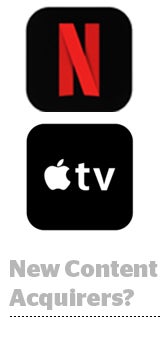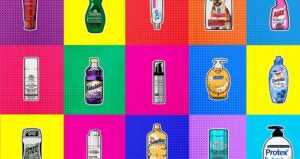Here’s today’s AdExchanger.com news round-up… Want it by email? Sign up here.
The O&O Studio
MGM has held talks with Apple and Netflix to gauge their interest in a sale, CNBC reports. Rumors of an MGM deal have swirled for years, but there’s more urgency now as media tech giants (AT&T, Apple, Amazon, Netflix, etc.) fuel up on exclusive content. MGM is in a category of companies, including Lions Gate and AMC, that are in no man’s land in the new media landscape: They’re among the largest content libraries available, but they don’t have enough scale to move the needle. MGM’s library includes the James Bond catalog and TV shows “Stargate” and “Mystery Science Theater 3000,” among others – not exactly HBO. And it needs a serious backer. MGM, AMC and Lions Gate are each valued at between $5 billion and $10 billion – too big for an easy acquisition or to avoid regulatory scrutiny. MGM’s value likely tops $10 billion, according to CNBC. A deal in that range would be a coup considering it was bought out of bankruptcy by private equity in 2010. MGM selling in the 11-digit range would put even more heat on the rest of the category to find a platform home. More.
Just Browsing
A seemingly minor update this week by the Google AMP team (check out the blog post) kicked up some dust between engineers for Apple’s Safari WebKit, Brave and Google Chromium. The new AMP feature, called Signed Exchange, caches publisher first-party cookies so the functionality isn’t lost when Chrome introduces its SameSite change on Feb. 4. “My assessment has always been that sites should not load under a faux first party,” tweeted John Wilander, the WebKit engineer behind Apple’s Intelligent Tracking Prevention software. It’s worth checking out the full thread. These browser code-based issues are deep in the weeds, but they sometimes spill over onto Twitter and in blogs, perhaps in part because browser engineers tend to be philosophically open source, so they hash out disputes in public – more like GitHub than commercial product development.
FTC Coming For Influencers?
The Federal Trade Commission (FTC) recently cracked down on influencer disclosures, but to date it’s only brought action against an influencer once – opting mostly to go after the marketers who hire them. But that may change. In a fireside chat at AdExchanger’s Industry Preview conference Tuesday, Andrew Smith, the FTC’s director of the bureau of consumer protection – speaking on his own behalf and not for the FTC – said that the agency has already released plenty of guidance for influencers about disclosure and issued many warnings, but it may be time to step up enforcement. “I do anticipate bringing action against them relatively soon,” Smith told AdExchanger senior editor Allison Schiff. If the FTC follows through, it’ll mark a shift in its view over who’s responsible for ensuring consumers know whether posts are sponsored. Traditionally, the FTC placed that burden on marketers, treating it as a “vendor management problem.”
But Wait, There’s More
- Fraudsters Used Grindr To Spoof Ads On Roku Apps And Devices – BuzzFeed
- Publishers Press Ad Tech To Protect Against Sequential Liability – Digiday
- Pinterest Intros AR Tech To Try On Makeup Before You Buy – blog
- Software Giant SAP Shows Signs That Revamp Is Bearing Fruit – WSJ
- Entertainment Education Company Encantos Raises $2M – release
- These Are The Fastest Growing Business Apps – Bloomberg
- Xandr’s Community Adds 4 Publishers – release
- The Facebook ‘Clear History’ Button Is Finally Here – Slate
You’re Hired
- Bill Kiriakis And Silvia Buermann Join Adjust Exec Sales Team – release
- New CEO For WPP Affiliate SYZYGY North America – MediaPost
- Former Adobe Travel Lead Joins Kambr As Commercial Chief – release












